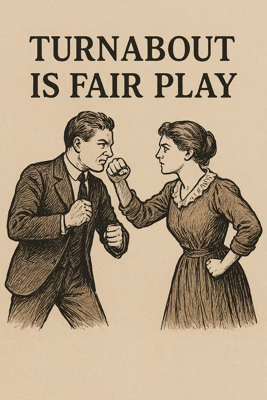Most of you are familiar with the well-worn maxim, “turnabout is fair play.” According to my brief research, the phrase originally arose in the context of gaming: each player was expected to take turns in order to ensure fairness. Like many expressions, it has broadened in meaning over time. Today it generally conveys the idea that if someone does something to me, it is acceptable for me to do the same to them. On the surface, it carries undertones of equity and justice.
In the wake of Charlie Kirk’s murder, we have seen this kind of turnabout unfold. A pendulum seems to be swinging: liberals and non-Christians who once pushed for Christians and conservatives to be canceled or doxxed are now experiencing the same sort of backlash.
This has been evident in the suspension or firing of individuals who mocked or even celebrated Kirk’s death. The question for us as Christians is this: how should we view such turnabout? Is it truly “fair play”? And more importantly, should we as believers take part in mainstreaming this kind of response?
Positive Signs
Over the past week and a half, individuals across the political and ideological spectrum have been united on two key points:
- Regardless of one’s opinion of Kirk as a person, his murder was wrong and abhorrent.
- It is vile to relish or rejoice in the violence that took his life.
These are not only commonsense observations; they echo the witness of Scripture. As the psalmist writes, “…but His soul hates the wicked and the one who loves violence” (Psalm 11:5). Those who delight in Kirk’s death reveal a heart that loves violence—particularly when it is directed at those they oppose. This is deeply troubling for our nation. Yet at the same time, it is encouraging to see others boldly denouncing such responses. For that, we can be thankful.
Free Speech
Nevertheless, questions remain, particularly concerning free speech. Some ask: Doesn’t the First Amendment protect a person’s right to rejoice in Kirk’s murder if they choose?
Two clarifications are important here:
- As mentioned earlier, any sane individual—liberal or conservative—can recognize the folly of celebrating the murder of someone who harmed no one.
- The First Amendment guarantees freedom from government punishment for speech, but it does not protect anyone from consequences in the private sphere. Employers, for instance, may still discipline or dismiss employees for words that bring disrepute.
With these caveats in mind, we return to the central question: how should we respond to this turnabout? Should we embrace it as justice? I would urge caution. As believers, we must not get swept up in the tide of “cancel culture.” Yes, the comments surrounding Kirk’s murder are abhorrent. And yes, we should take every opportunity to say so. But our calling goes deeper than simply policing public speech.
Conclusion
In all of this, we must not miss the forest for the trees. Our mandate is far greater than monitoring how others speak. We are called to summon the nations to repentance and to command them to bow before our Lord Jesus Christ. Alongside this, we are to devote ourselves to good works toward one another and toward our neighbors. Don’t miss this great opportunity to proclaim the truth boldly and confidently. For God has brought all things to this moment.
As I close, let us all pray that we would honor our Lord and model Him his faithfulness as He walked this earth. In the final analysis, that is what Charlie Kirk sought to do—both in life and in death.

